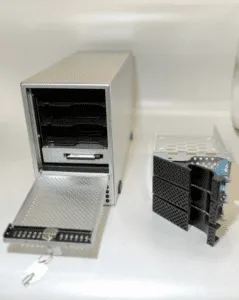Reading, United Kingdom –Solid State Disks Ltd (SSDL), the advanced storage systems design, development and integration specialist, has won a contract to replace the hard disk drives in process equipment operated by a leading semiconductor manufacturer. The legacy drives, which have SCSI interfaces, reside in canisters within DEC BA353-AA and DEC BA356-KC towers, which originally were housed in three and six canisters, respectively.
As a minimum, the project will see SSDL replacing the HDDs with its highly reliable, CompactFlash (CF) based CF2SCSI™ SCSIFlash™ drives, which have already been evaluated by the customer on test beds and been subjected to live network testing. The interface to the host system’s SCSI connections will be accommodated using the SCSIFlash SSD drive, which supports CF drives up to 256GB and utilizes a 3.5 or 5.25-inch form factor.
“By combining SCSI and CompactFlash technologies, our SCSIFlash drive future-proofs computer-based legacy equipment that depends on worn out and obsolete SCSI drives for which replacements and spare parts are scarce,” said James Hilken, Sales Director of SSDL.
However, as the canisters and towers are also original equipment, and showing signs of wear, once the project commences it might be decided to replace the towers with solid-state solutions in either a rack or a new tower as at least another 10 years of service will be required of them.
“As the drives in legacy systems age and their electro-mechanical components fail, it is becoming increasingly difficult to replace or repair them as replacement drives and spare parts simply may not be available,” continues Hilken. “Sourcing second-hand units to cannibalize doesn’t really provide a lasting or safe solution either. In contrast, using the SCSI Solid State Drive and Industrial CompactFlash technology to replace them provides a low-cost, fast and efficient solution that increases reliability and reduces unplanned downtime due to its solid state, non-moving part design.”
Hilken concludes by saying the replacement of just the drives represents the quick fix solution, but it doesn’t necessarily guarantee overall long-term reliability because of the age of the canisters and towers into which the drives will be placed. “We have a strong partnering philosophy and always align ourselves with our customers’ longer-term objectives, so biting the bullet and switching to solid-state towers may prove to be the best option.”









